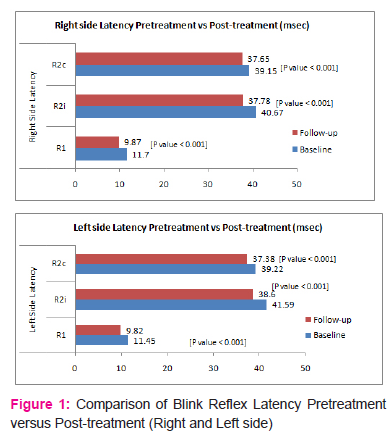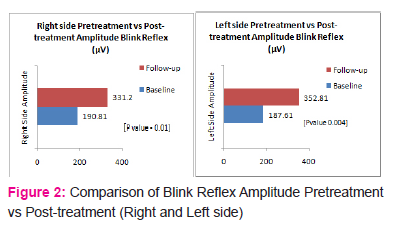IJCRR - 9(5), March, 2017
Pages: 38-40
Date of Publication: 20-Mar-2017
Print Article
Download XML Download PDF
Reversible Alteration of Blink Reflex in Hypothyroid Patients in Response to Treatment
Author: Sharma G.1, Aprajita2, Aggarwal S.3
Category: Healthcare
Abstract:Background: Hypothyroidism is associated with central and peripheral nervous system disturbances. It affects the CNS due to the impairment of the sensory pathways secondary to hormonal imbalances causing segmental demyelination. It also affects the transmission of impulses along the complex polysynaptic pathways, such as those mediating the blink reflex.
Objective: Evaluation of Blink Reflex for early diagnosis of neurological dysfunction in hypothyroid patients and to study the response to treatment.
Method: Blink Reflex was recorded using RMS EMG EP MK2 machine in 30 overt hypothyroid patients (serum TSH ?10 mIU/L) between 18 \? 50 years of age who were followed up after 3 months of treatment.
Result: The latency of blink reflex showed an early ipsilateral R1 response and late R2 responses (ipsilateral R2i, contralateral R2c) which were found to be prolonged in the patients. Following the hormonal replacement therapy the latency tend to decrease while the amplitude was increased.
Conclusion: Increased latency of blink reflex indicates impairment predominantly of the sensory pathways. These changes are further more altered in untreated patients in the advanced stage of the disease. Hence blink reflex is useful non-invasive tool for early detection of cranial neuropathy in newly diagnosed hypothyroid patients and to access their response to treatment.
Keywords: Central Nervous System (CNS), Thyroid Stimulating Hormone (TSH), Blink reflex (BR)
Full Text:
Introduction
Central nervous system (CNS) dysfunction is an important consequence of thyroid deficiency. The metabolic and hormonal changes in hypothyroidism cause CNS dysfunction.[1,2] Thyroid hormone is known to influence the synthesis of protein and the production of enzyme and myelin.[3] Myelin synthesis is an important factor in determining the speed of impulse transmission along complex polysynaptic pathway such as those mediating the evoked potential and blink reflex.[3,4] Blink reflex (BR), has been shown to be an effective method for revealing subclinical involvement of cranial nerves in generalized neuropathies.[5] The electrically elicited BR is an exteroceptive-nociceptive reflex recorded on the orbicularis oculi muscle. It is comprised of three components : R1(ipsilateral), R2i (ipsilateral) and R2c (contralateral).[3]
Material and Methods
The present study was conducted in the Department of Physiology, Pt.B.D.Sharma PGIMS, Rohtak, Haryana in collaboration with the Department of Endocrinology. The study was approved by the ethical committee of PGIMS, Rohtak. This study was planned to find out the response to hormone replacement therapy and also to find the correlation between the thyroid function tests and the blink reflex parameters both pre and post treatment which has not been established clearly in the older studies.
Inclusion criteria: Newly diagnosed hypothyroid patients of age group 18-50 years were included in the study that fulfilled the following criteria Overt hypothyroid – Elevated TSH ≥ 10mIU/L and decreased free T4 and/or T3. Routine relevant biochemical tests were carried out.
Exclusion criteria: Patients with chronic disorders i.e. diabetes mellitus, cerebrovascular diseases, motor neuron diseases, parkinsonism, multiple sclerosis, neuromuscular disorders, smoking, alcoholism. Patients who had other illnesses or were taking medications which could
affect the peripheral and/or central nervous system were excluded.
Blink reflex recording:
Subjects were asked to sit in a relaxed position in a quiet room with eyes open. The recording was done simultaneously from both sides. Active electrode was placed at inferior orbicularis oculi muscle bilaterally while the reference electrode was placed just lateral to the lateral canthus bilaterally. Ground electrode was placed on the forehead and the supraorbital nerve was stimulated on both sides. Three parameters were recorded i.e. R1, R2i (Ipsilateral) and R2c (Contralateral).
Blink Reflex settings: Sweep speed - 10 ms per division, sensitivity 200 ìV per division, filter setting 2Hz to 10 kHz, electrical pulse 100 ìs duration and intensity 15-25 mA.[6]
Observation and Results – Statistical analysis was done using SPSS software. The data was analyzed/described using mean and standard deviation. ‘P’ value <0.05 was taken as significant.

Blink Reflex latency was decreased following treatment with levothyroxine after a period of 3 months. Student’s paired t-test was used for the statistical analysis. P-value was found to be significant (p<0.001) for R1, R2i, R2c both on the right as well as left side. (Figure 1)

Blink Reflex amplitude was increased following treatment with levothyroxine after a period of 3 months. Student’s paired t-test was used for the statistical analysis. P-value was found to be significant (p<0.05) both on the right as well as left side. (Figure 2)

< 0.3 is Mild correlation, 0.3 to 0.5 - Moderate correlation and > 0.5 - Strong correlation.
Positive correlation - indicated by + ve values, Negative correlation – indicated by – ve values
There is no significant correlation of pre-treatment TSH, T3 and T4 with various blink reflex parameters R1, R2i, R2c. (Table 1)
Post-treatment TSH values also show no significant correlation pattern with blink reflex parameters R1, R2i, R2c. (Table 1)
Discussion
In the present study there was prolongation of blink reflex latencies while decrease in the amplitude in hypothyroid patients. Our findings coincides with the observation in older studies by Nazliel et al and Yuksel et al.[3,7] Latter similar studies have also been proved by Pawar et al, Oflazoglu et al and Kakked et al. [5,8,9] Our observation is also co-existent with these findings. In the present study we have also incorporated the treatment part to study and relate the changes in the blink reflex latencies and amplitude following the hormone replacement therapy which has not been studied previously. There was a decrease in the blink reflex latencies while the amplitude showed improvement after a follow up period of 3 months with levothyroxine. According to the present study there was no correlation between R1, R2i, R2c latencies and amplitude with serum thyroid hormone levels.
Neurological dysfunction associated with disorder of the thyroid gland is the result of hormonal imbalance and is related to the immune mechanism associated with thyroid diseases.[2,10,11] The thyroid hormone affects the central and peripheral nervous system via its role in gene expression, myelin production, its effects on the neurotransmitter system and axonal transportation.[4,12] In hypothyroidism the metabolic alteration caused by hormonal imbalance affects the Schwann cell, inducing a segmental demyelination. Primary axonal degeneration has also been proved in hypothyroidism electrophysiologically. Initially only functional loss is seen in nerve, but later structural alteration may occurs as the disease progresses.[13] Low body temperature, diminished myelin production and alteration in cerebral metabolism during acute hypothyroidism may be the cause for blink reflex alteration in hypothyroid patients.[5]
Conclusion
The present study was done to evaluate the efficacy of BR for early diagnosis of subclinical cranial neuropathy in hypothyroid patients and to study the response to hormonal replacement therapy. The electrophysiological studies of blink reflex might be useful in revealing the subclinical abnormality of cranial nerves, caused mainly due to the hormonal and metabolic changes occurring early in the disease course. [9] Thus blink reflex is a useful non-invasive tool for early detection of clinically silent cranial nerve involvement in hypothyroid patients with or without polyneuropathy. [5] The severity of CNS dysfunction in hypothyroidism depends upon degree and the duration of hormonal deficiency. Hence electrophysiological and clinical improvement is seen in such patients after hormone replacement therapy. [12]
Acknowledgement
Mr. Randhir (lab technician) for his cooperation.
Dr Sahul Bharti for his co-operation
Footnotes
Source of Support: Nil
Conflict of Interest: None declared
References:
1. Khedr EM, El Toony LF, Tarkhan MN, Abdella G. Peripheral and central nervous system alterations in hypothyroidism: electrophysiological findings. Neuropsychobiology. 2000 Jan;41(2):88–94.
2. Cakir M, Samanci N, Balci N, Balci MK. Musculoskeletal manifestations in patients with thyroid disease. Clin Endocrinol (Oxf). 2003 Aug;59(2):162–7.
3. Nazliel B, Ylmaz MM++, Gokce M, Yetkin IM+, Baysal AI. Blink Reflex in Hypothyroidism. Endocrinologist. 2007 Jun;17(3):144–7.
4. Ladenson PW, Stakes JW, Ridgway EC. Reversible alteration of the visual evoked potential in hypothyroidism. Am J Med. 1984 Dec;77(6):1010–4.
5. Sachin Pawar VU. Usefulness of blink reflex in hypothyroid patients with or without polyneuropathy: a case control study. Indian J Physiol Pharmacol. 2014;58(1):56–60.
6. Michael J A. Electromyography in clinical practice. In: 5th ed. Elsevier 2005;
7. Karlikaya G. Nerve Conduction Studies, SEP and Blink Reflex Studies in Recently Diagnosed, Untreated Thyroid Disease Patients. J Neurol Sci Turk. 24(1):007–15.
8. Oflazo?lu B, Somay G, Us O, Surardamar A, Tanrida? T. Median sep and blink reflex in thyroid diseases. Electromyogr Clin Neurophysiol. 2006 Nov;46(6):365–70.
9. Kakked G, Bhatt N, Lakhani J, Prakash S. Electromyographic evaluation of blink reflex as a tool for early diagnosis of neurological dysfunction in patients of hypothyroidism. Ann Neurosci. 2013 Jul;20(3):95–8.
10. Duyff RF, Van den Bosch J, Laman DM, van Loon BJ, Linssen WH. Neuromuscular findings in thyroid dysfunction: a prospective clinical and electrodiagnostic study. J Neurol Neurosurg Psychiatry. 2000 Jun;68(6):750–5.
11. Tonner DR, Schlechte JA. Neurologic complications of thyroid and parathyroid disease. Med Clin North Am. 1993 Jan;77(1):251–63.
12. Nemni R, Bottacchi E, Fazio R, Mamoli A, Corbo M, Camerlingo M, et al. Polyneuropathy in hypothyroidism: clinical, electrophysiological and morphological findings in four cases. J Neurol Neurosurg Psychiatry. 1987 Nov 1;50(11):1454–60.
13. Ozkardes A, Ozata M, Beyhan Z, Corakci A, Vural O, Yardim M, et al. Acute hypothyroidism leads to reversible alterations in central nervous system as revealed by somatosensory evoked potentials. Electroencephalogr Clin Neurophysiol. 1996 Nov;100(6):500–4.
|






 This work is licensed under a Creative Commons Attribution-NonCommercial 4.0 International License
This work is licensed under a Creative Commons Attribution-NonCommercial 4.0 International License